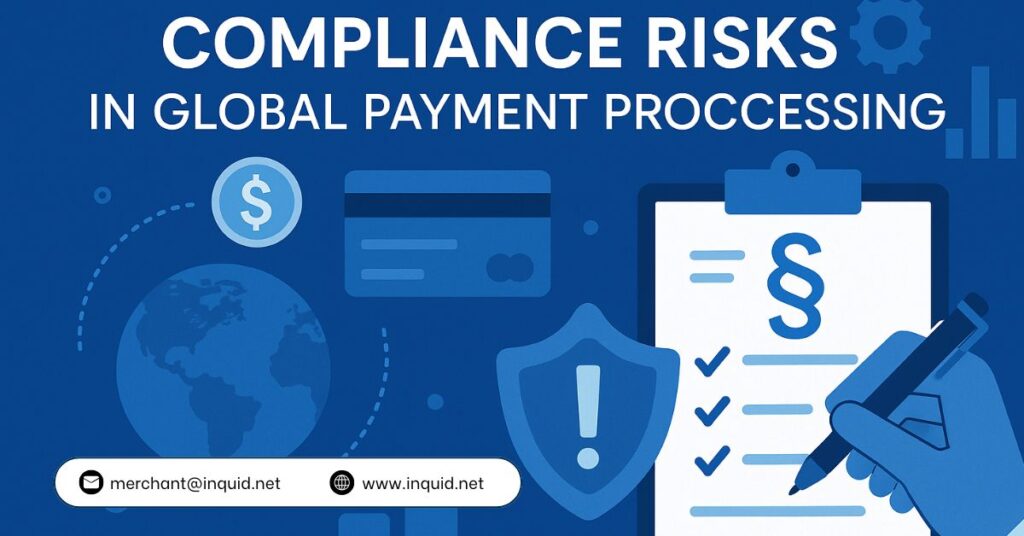
Handling payments across countries goes far beyond tech and transactions. At the heart of global payment processing compliance is a complex mix of legal expectations, banking regulations, data rules, and financial policies. Failing to meet these standards doesn’t just slow things down — it can shut down your payment channels entirely.
Whether you’re running an ecommerce business, a high-risk merchant operation, or expanding into new markets, understanding the compliance risks in global payment processing is not optional. It’s the difference between scaling smoothly and getting flagged, fined, or even blacklisted.
What Compliance Means in Global Payments
Compliance in global payment processing covers a mix of legal, regulatory, and card network obligations. At the core, it’s about making sure your transactions align with the laws in each country you operate in. But it doesn’t stop there.
Each acquiring bank, payment provider, and even some digital wallets have their own risk policies. That means what’s acceptable in one region could be rejected in another — even if the transaction looks identical.
You’re not just following the rules of one country. You’re navigating through many, all at once.
Key Risks That Merchants Face
1. Licensing and Regional Restrictions
Not every country allows foreign businesses to accept payments without specific permissions. Some regions require local representation, while others restrict certain industries outright. If your gateway or merchant account isn’t compliant with regional licensing, you risk full payment holds or legal action.
2. KYC and AML Violations
Know Your Customer (KYC) and Anti-Money Laundering (AML) policies are now standard, and failing to meet them is a fast way to get blacklisted. Global payment processors run background checks, review business models, and verify documentation. Incomplete or inconsistent records raise red flags — especially in high-risk industries.
If your business falls into a flagged category, make sure you’re working with providers experienced in managing that classification. Platforms like inquid specialize in helping merchants stay on the right side of compliance while still accessing international payment options.
3. Data Privacy Regulations
Processing cards globally means handling sensitive information across borders. Countries like Germany or France enforce strict data policies under GDPR. Others, like India or Brazil, have their own data localization rules.
Storing or transmitting data incorrectly — or through unapproved channels — opens up penalties that can scale with your revenue. If you’re using a payment gateway that isn’t up to standard, you’re the one liable.
4. Chargeback Abuse and Fraud Risk
Chargebacks are part of the payments game, but high chargeback rates can trigger scrutiny from both processors and card networks. If you’re not actively managing fraud exposure, especially in global sales, you risk being labeled as high-risk — which brings tougher underwriting and stricter transaction limits.
This is even more critical for businesses in sectors like gaming, crypto, or subscription services.
5. Card Network Violations
Visa, Mastercard, and other networks publish their own rulebooks. Some regions enforce these more aggressively than others. Violations such as using incorrect MCC codes, misrepresenting your business model, or failing to disclose subscription terms can lead to heavy fines or outright bans.
Staying Ahead of Compliance Challenges
There’s no one-size-fits-all checklist, but a few habits make a big difference:
- Work only with experienced global processors who understand multi-jurisdictional compliance.
- Keep your business documentation up to date and consistent across platforms.
- Monitor chargebacks and fraud metrics actively — don’t wait for the processor to flag them.
- Review local regulations when entering a new market — don’t assume what worked elsewhere will apply.
To get a clearer understanding of how global processing works at a foundational level, you can read this guide to global payment processing basics.
Final Thoughts
Compliance risks are often buried beneath layers of transactions and provider agreements — until they surface as a hold, fine, or shutdown. By taking the time to understand and address these risks early, merchants give themselves more room to grow safely across borders.
If you’re unsure where your business stands or how to move forward with confidence, contact the inquid team. Working with a processor that stays ahead of regulatory shifts is one of the smartest decisions you can make in global commerce.
